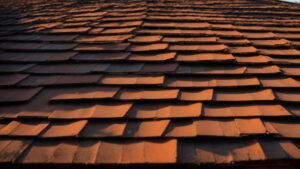Importance of home value
Increasing your home’s value can benefit you in numerous ways. It can lead to higher appraisal values, better selling prices, and increased equity. A good roof conversion can significantly enhance your property’s curb appeal and overall aesthetics, making it more attractive to potential buyers. Improving your home’s value can also provide financial security and peace of mind. It’s an investment that can pay off in the long run, whether you decide to sell in the future or simply want to enjoy a more valuable living space.

Assessing the condition of your roof
When determining the value of your home, assessing the condition of your roof is crucial. A well-maintained and sturdy roof can significantly increase the overall value of your property. Here’s what you need to keep in mind:
-
Regular inspections: Conduct regular inspections to identify any signs of damage or wear and tear. Look out for missing or damaged shingles, leaks, or moisture build-up.
-
Age of the roof: Consider the age of your roof. Most roofs have a lifespan of 20-25 years, so if your roof is nearing this age, it may be worth considering a conversion to enhance its durability and appeal.
-
Structural integrity: Pay attention to the structural integrity of your roof. Any sagging or signs of structural damage should not be ignored, as they can affect the overall value of your home.
By prioritizing the condition of your roof, you can ensure that your home maintains its value and appeal in the long run.Types of roof conversions
Most homeowners prefer the loft conversion as it offers significant space for a new room or additional storage. The gable-to-gable conversion is another popular option, providing a straight wall with a new gable wall at the end. Additionally, there’s the hip-to-gable conversion best suited for houses with hipped roofs, turning the sloping side into a flat gable to create more space. Lastly, the dormer conversion is popular due to the creation of additional headroom and floor space, often involving a small extension vertically from the slope of the roof.
Choosing the right roof conversion for your home
When choosing a roof conversion for your home, consider the following factors:
-
Cost: Different roof conversion options have varying costs, so it’s essential to weigh the expense against the potential increase in your home’s value.
-
Material: The material used for the roof conversion can affect durability, maintenance, and overall aesthetics.
-
Local climate: Take into account the weather conditions in your area to ensure that the chosen roof conversion can withstand various elements.
-
Aesthetics: Consider how the roof conversion will enhance the overall look of your home and complement its architectural style.
Benefits of a roof conversion
Roof conversions provide various benefits that can significantly increase the value of your home. Here’s why you should consider it:
-
Extended Living Space: A roof conversion adds extra usable space to your home, giving you the opportunity to create an additional bedroom, office, or recreational area.
-
Enhanced Property Value: A well-executed roof conversion can substantially increase the market value of your home, offering a higher return on investment if you decide to sell in the future.
-
Improved Energy Efficiency: Upgrading your roof during the conversion process can result in better insulation and energy efficiency, potentially reducing your utility bills.
-
Enhanced Aesthetic Appeal: A well-designed and executed roof conversion can enhance the overall aesthetic appeal of your property, making it more attractive to potential buyers and improving curb appeal.
Cost considerations
Roof conversions can vary in cost depending on the type of conversion and the size of your home. Here are the main factors that will affect the cost:
-
The type of roof conversion you choose, such as a loft conversion or a roof extension
-
The materials used for the conversion
-
The size and complexity of the project
-
The labor costs in your local area
-
Any additional features or modifications you want to include in the conversion, such as skylights or integrated storage solutions.
Finding the right roofing contractor
When looking for a roofing contractor, it’s important to do your research and find a professional with the right experience and expertise. Here are a few key points to consider:
-
Look for a contractor with a proven track record of successful roof conversions.
-
Check for licensing and insurance to ensure you are working with a legitimate and reliable contractor.
-
Ask for references and take the time to check their previous work to gauge their quality.
-
Get detailed estimates in writing to ensure transparency in costs and services provided.
-
Communication is key – make sure the contractor is responsive and can effectively communicate their plans and progress with you throughout the project.
Roof conversion process
Roof conversion process involves assessing the current condition of your roof, evaluating the potential for converting to a different type of roof, obtaining necessary permits, removing the existing roofing material, installing new roofing material, and ensuring proper insulation.[1] It’s important to hire a qualified roofing contractor to ensure a thorough and successful conversion.
Maintenance and upkeep
Regular maintenance and upkeep are crucial to preserving the value of your home. This includes inspecting your roof regularly for any signs of damage or wear, cleaning the gutters to prevent water damage, and addressing any issues promptly to prevent further deterioration. Ensuring proper ventilation in the attic is also essential. By staying on top of maintenance, you can extend the lifespan of your roof and maintain the value of your home.
Increasing your home value with a new roof
Adding a new roof to your home can significantly increase its market value. A well-maintained, high-quality roof is a key selling point for potential buyers. Additionally, it can enhance the overall appearance and curb appeal of your home, making it more attractive to potential buyers. Investing in a new roof can also provide better energy efficiency and protection from the elements, which can be appealing to prospective buyers. If you’re looking to sell your home or increase its value, a new roof can be a smart investment.




